Psychopaths: Cinema’s Worst Critics
Psychopath: someone with empathy, but without compassion. Someone who can understand humanity, but cannot feel for humanity. By this definition, psychopaths predictably take the lead in many horror films, such as Silence of the Lambs, The Shining, and Sweeney Todd. However, psychopaths also take on another important role: the role of critics. In this article, three psychopathic critics will be explored: Tyler Durden from Fight Club, Amy Dunne from Gone Girl, and Lou Bloom from Nightcrawler.
Before we begin exploring the role of these three psychopaths, it is crucial to understand the role of psychopaths in general. What differentiates a psychopath’s critique from other characters’ critiques? The answer lies in the above definition of psychopathy. In other words, it relates to psychopaths’ ability to understand their societies, but not feel for their societies. Emotionally unattached from their worlds’ values, ideologies, and norms, psychopaths can provide an unfiltered critique of these values, ideologies, and norms. Other characters may be emotionally invested in those ideologies, making them unwilling or unable to critique them. Psychopaths, on the other hand, are not invested whatsoever, making the following three psychopaths unnerving critics of society.
Fight Club‘s Tyler Durden
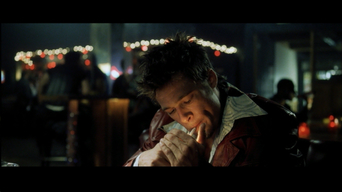
Fight Club, based off of the novel by Chuck Palahniuk, follows the story of Tyler Durden. As indicated by the title, Tyler spreads a network of underground fight clubs. At these clubs, Tyler gives speeches in which he criticizes consumerism and the American Dream. In other words, he provides criticism that many Marxist critics would worship, as seen in Tyler’s following speech.
An entire generation pumping gas, waiting tables, slaves with white collars. Advertising has us chasing cars and clothes, working jobs we hate so we can buy shit we don’t need. We’re the middle children of history, man. No purpose or place. We have no Great War. No Great Depression. Our Great War’s a spiritual war…our Great Depression is our lives. We’ve all been raised on television to believe that one day we’d all be millionaires and movie gods and rock stars. But we won’t. And we’re slowly learning that fact. And we’re very, very pissed off.
The very goal of consumerism is challenged when Tyler describes our belongings as “shit we don’t need.” The American Dream, in which we can become anyone we want through hard work and perseverance, is dismantled with a single phrase: “But we won’t.”
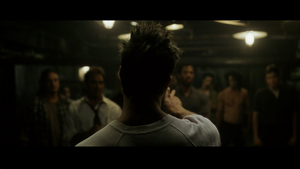
Although this criticism is certainly powerful, it’s crucial to understand Tyler’s use of “we.” Outside of the film’s context, “we” can be interpreted as any individual caught in the ideologies of consumerism and the American Dream. However, it’s important to note that “we” in the film is the group in that night’s fight club. This group consists exclusively of men. They are also working class men, as seen by Tyler’s description of “pumping gas, waiting tables, slaves with white collars.” Indeed, many men in this particular scene are wearing collared shirts.
To call this group of men an “entire generation” is quite an overstatement. Rather, this group is a select population of working class men, which excludes women, lower class individuals, and basically anyone outside of fight club. Tyler does provide excellent criticism of consumerism and the American Dream, both of which are impactful ideologies. Having said that, it’s equally important to remember that they aren’t the only ideologies affecting us. Ideologies of gender, for instance, constantly shape Fight Club and shape our everyday lives. These gender ideologies are criticized by the next psychopath.
Gone Girl‘s Amy Dunne
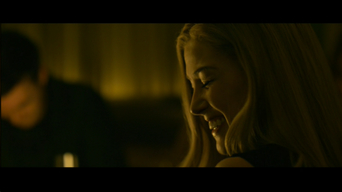
In the film adaptation of Gillian Flynn’s Gone Girl, gender doesn’t remain unquestioned and unchallenged. On the contrary, Amy Dunne – a primary protagonist and the unhappy wife of Nick Dunne – brings gender into the spotlight. This spotlight can be seen when Amy says the following.
Nick loved a girl I was pretending to be. Cool girl. Men always use that, don’t they? As their defining compliment: She’s a cool girl. Cool girl is hot, cool girl is game, cool girl is fun, cool girl never gets angry at her man. She only smiles in a chagrined, loving manner.
Cool girl is not unique to Amy. The idea of the woman striving to serve the man’s needs has long permeated American gender roles. Except the focus used to be on women’s domestic role, in which a wife must care for the children, house, and husband. Now, the focus has changed to a woman’s ability to have fun, but only in the way that a man wants to have fun. Cool girl must be game, but only with the game that the man wants to play. What hasn’t changed is the expectation that women must not complain, whether the woman is fulfilling the role of housewife or cool girl. Either way, she “never gets angry at her man. She only smiles in a chagrined, loving manner.”

However, just as Tyler Durden’s criticism has gaps, so does Amy Dunne’s. Just as Tyler speaks of an “entire generation” while speaking only to working class men, Amy speaks of all “men” when speaking only to certain men attracted to certain women. This position is not only heteronormative; it also ignores other social identities, such as race and class. For instance, all of Amy’s lovers are white, which means that Amy’s personal experience with men refers specifically to white men. In addition, all of her lovers are relatively wealthy, which means that Amy is specifically talking about white middle/upper class men attracted to women. As seen by this example, Gone Girl neglects social identities besides gender, just like Fight Club neglects ideologies besides consumerism and the American Dream. Although gender, consumerism, and the American Dream play significant roles, other identities – such as sexuality, class, and race – also play significant roles. These other identities are never discussed in either Fight Club or Gone Girl, which is a pattern that the psychopath of Nightcrawler breaks.
Nightcrawler‘s Lou Bloom
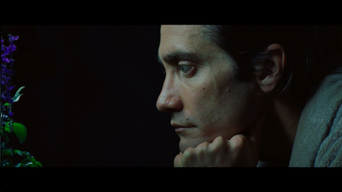
Lou Bloom – Nightcrawler‘s primary protagonist – films violent crimes for the news station KWLA. Lou sees how news stations exploit violent crimes, and this use of violence in the media becomes the film’s central critique. Except while Tyler and Amy choose to rebel against society, Lou chooses to go along with the flow. After all, Lou benefits from this society by selling his clips of violent crimes. Additionally, he doesn’t exhibit any desire to create a better society. “Maybe,” he says, “it’s not that I don’t understand people. Maybe I just don’t like them.” This statement embodies the psychopath’s ability to empathize with human beings without exhibiting compassion.
What makes Nightcrawler most interesting though isn’t Lou’s compassionless approach to the world. Rather, it’s Lou’s ability to understand the intersectionality of our identities, which is something that both Fight Club and Gone Girl lack. This intersectionality doesn’t begin with Lou. It actually begins with Nina, who is KWLA’s news director. Nina tells Lou, “We find our viewers are more interested in urban crime creeping into the suburbs. What that means is the victim or victims preferably well off, and white, injured at the hands of the poor, or a minority.” By stating that viewers are most interested in seeing wealthy whites victimized by poor nonwhites, Nina clarifies the intersectionality of race and class.
While this statement may make Nina seem like a racist classist, the fact that “viewers” are “more interested” in this crime leads one to wonder the following question: who is the real villain in this society? Is it Nina, who perpetuates the stereotypes of the poor and nonwhites as criminals? Or is it the viewers, who respond most actively to these stereotypes, since these stereotypes embody what they believe to be true about the world?
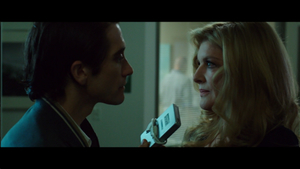
Or is the villain Lou, who responds to Nina’s statement by actively seeking footage of these very crimes? One crime, for instance, involves a triple murder. Lou films the three bodies before the police even arrive at the crime scene. Later, while negotiating the price of this film with Nina, Lou strives to raise the video’s value by emphasizing, “These are three wealthy white people shot and killed in their mansion, including a suburban housewife, shotgunned in her bed.” In this footage, class (“wealthy”), race (“white”), and even gender (“housewife”) intersect. Lou understands this particular intersectionality, and he exploits it rather than goes against it.
Does Lou’s choice to exploit intersectionality make him Nightcrawler‘s most villainous character? Perhaps. Considering that many characters endorse Lou’s graphic clips, however, one is led to recognize that society itself is psychopathic. Just as Lou goes with the flow by filming violence, Nina goes with the flow by airing violence, and viewers go with the flow by seeking violent footage. From this response, it’s clear that Lou is only one of many villains in Nightcrawler. Having said that, Lou’s comprehension of intersectionality does set him apart from the psychopaths of Fight Club and Gone Girl. Tyler Durden, Amy Dunne, and Lou Bloom all empathize without exhibiting compassion, making each psychopath an unnerving critic of society. Only Lou, however, discusses intersectionality, making him stand out from the others in his own psychopathic society.
What now?
After analyzing Tyler Durden, Amy Dunne, and Lou Bloom, an important question to ask is this: What comes next? Now that we’ve studied how psychopaths criticize their societies, how do we respond to this critique?
What’s important to remember is that psychopaths aren’t just critiquing “their” societies; they are critiquing our societies. Although Fight Club, Gone Girl, and Nightcrawler are not perfect portrayals of American society, they do critique many American ideologies that directly impact our everyday lives. Consumerism, the American Dream, gender roles, racial discrimination, and class privilege are all integrated into our society and into our ways of thinking about the world. Psychopaths remind us to take a step back from our own mindsets by critiquing what we think we know. Although psychopaths’ emotional distance makes them excellent critics, we need not be psychopathic in order to critique our society; we need only to learn about the ideologies impacting ourselves and others. Although some psychopaths exploit this knowledge, like Lou Bloom, it is equally possible to utilize this knowledge constructively by challenging the destructive ideologies of our society.
Works Cited
Fincher, David, dir. Fight Club. 1999. Twentieth Century Fox, 1999. DVD.
Fincher, David, dir. Gone Girl. 2014. Twentieth Century Fox, 2015. DVD.
Gilroy, Dan, dir. Nightcrawler. 2014. Universal Studios, 2014. DVD.
What do you think? Leave a comment.











I think Travis from Taxi Driver (1976) would have been a good example. He wants critques the immorality of society yet attempts to solve it in the wrong way.
The best psychopaths in films are the ones that have a dark message behind them. Nightcrawler reflecting the inhuman news media. Taxi Driver reflecting how ugly 1970’s New York has become. Your article captured that perfectly.
I haven’t seen Taxi Driver. Based on your description though, it seems like a great film with valuable critique on urban society.
I think psychopaths were more inwards than out wards, they keep their feelings more hidden and are able to blend in.
Jack Torrance from the 1980 psychological horror film The Shining
..just some quick names:
Malcolm McDowell on Calligula (1979) was great psychopath.
Daniel Day-Lewis on “There will be blood” bloody crazy!
Ofc Jack Nicolson on “The Shining” and 1/3 of his movies
Nicolas Cage on half of his movies 😉 (Vampire’s Kiss etc)
Jon Malcovich on 105% of his movies
Hannibal Lecter.
It’s hard to be sure whether or not Lecter is a psychopath. He has the meticulousness, ability to fit in, and the inherent charm/trustworthiness of a psychopath, and the backstory, criteria for choosing his victims, and the seemingly skewed moral compass of a sociopath.
Hannibal Lector was a sociopath, he was able to feel empathy, a trait lost to true psychopaths.
I would want to hang out with these psychos!!
I am so dissapointed, where the hell was Keyser Soze??
Joe Pesci in Goodfellas
Norman Bates baby the original Psycho from the movie PSYCHO!!
Norman bates was not a psychopath he had multi personality disorder, there is no defining difference between psychopaths and sociopaths but the level of aggression to which they commit their crimes, there you go…
where is jason voorhees?
Jason Voorhees had a lot of mental problems, it is debatable as to whether or not he actually fits the definition of psychopath given in this article. We are unaware of Jason’s upbringing, but we do know that he does not fully understand how society works. He did not have the necessary interactions with other individuals to develop emotionally and socially. His mother was convinced that he was dead, but once she was killed Jason sought to avenge her death (just as she had).
One of my favorites is the young lady in “American Psycho II.” She definitely has anti-social personality disorder, murdering freely to further her college career, and to gain admittance to the FBI academy.
So no Anton Chigurh from No Country For Old Men?
Anton Chigurh is an excellent example of a psychopath in film.
A great example! Especially since No Country For Old Men continues to be a beautiful analogy for America.
Alex from a clockwork orange is the best antagonists of all time, maybe because you end up feeling sorry for him. he even needed a brainwash to fit into society again
Alex is a great example. That film (and the book it was based on) are jam-packed with critique on a dystopian society.
I’m happy to see so many people thinking of their own examples. I’d like to challenge everyone to think about how these examples of psychopaths offer critique for society. Taxi Driver’s Travis (critiquing urban society) and Clockwork Orange’s Alex (critiquing dystopian society) are two great examples I’ve seen so far. Let’s keep the list going!
John Malkovich in Line of Fire, Bruce Dern in The Cowboys, Michael C. Hall as Dexter, Javier Bardem as Anton Chigurh, Jack Nicholson as Jack Torrence (Shining). Also, for a few brief minutes on screen, the “Private Pyle” character in Full Metal Jacket, in the bathroom when he decides he’s not going to take it anymore.
I think there were a lot of great points brought up in this article. Lou Bloom happens to be one of my favorite film characters, and I’m starting to realize that it’s not just a coincidence. I love characters that stand for something more than their roles, and psychopaths are a great liaison to seeing that come to fruition. They do indeed critique society, much in the way that satire is able to conjure up controversial thoughts into consumable media. This way, it is able to inject new ideas into a society that can sometimes be viewed as simplified and static. Great points. I feel like this can benefit from further exploration. Cheers!
The most frightening thing about Bloom is that his view is really just taking the desires of media to their greatest extreme.
The point about ‘intersectionality’ is interesting. I would suggest that Lou in Nightcrawler is really a place-holder for the unscrupulous media, and Nina for the public that knows better but is nonetheless titillated by vulgar horrors.
Another distinction you don’t mention is that whereas the first two movies address concepts already widely contested (consumerism & sexism), Nightcrawler speaks to an issue about which our society and culture are ambivalent – the morbid voyeurism of the news media.
It doesn’t ask us to challenge the status quo for which others are responsible – it asks us to challenge our own habits and doings.
I think it’s clear from Lou’s complicity in actually generating violent criminal activity that he’s not merely an observer of the human condition. He’s its product and an active agent. And he will and does exist – only we can stop him.
Brilliant comparative article. I’ve seen all three of the films mentioned, and I must say the one that stood out the most to me was Gone Girl. The female psychopath is one too often forgotten in cinema as well as in literature. Amy plays into this very stereotype and gets away with murder by doing so. I think the psychopaths in both cinema and literature truly make for the most interesting and thoughtful characters.
I watched Nightcrawler just recently and was blown away. I think the film is meant to make humans feel guilty for “our” behaviour,” and it did for me. It was also pretty freaky to see Jake Gyllenhaal the way his was in the movie.
As for another example, I recently saw a movie called The Factory starting John Cusack and Jennifer Carpenter. They’re assigned to a case where teenage girls have been kidnapped and killed, but it turns out that the kidnapper is actually keeping the girls in his basement and using them as a “factory” to create babies. By accident the kidnapper takes Cusack’s daughter, who didn’t fit the normal profile, and she fights back. However, the ending totally throws you for a loop (I won’t spoil it) and you find out that the person you thought was helping, wasn’t. It is this person that I would define as a psychopath as per this article.
It didn’t get good ratings on IMDB, but I was fairly impressed. It’s worth watching at least once. (Especially because my description does not do it justice!)
I found this article fascinating, and I really appreciated how you pointed out in the context of “Fight Club” that the “we” Tyler Durden uses refers to not the entire generation of individuals, but to a small group of working-class men defined by the parameters of the club. It’s always interesting for me to discover a new perspective about a film I’ve watched so many times. However, I do wonder how Marla Singer would fit into Tyler Durden’s equation, that “we’re the middle children of history.” Is Marla one of these children? Would Tyler ever make a similar speech to a room full of Marla Singers? How does Marla fit into such a male-dominated world–does she subvert or conform to men’s, especially Tyler’s, expectations? Also, does Marla exhibit any slightly psychopathic habits that would also correspond to the ideas you posit in this article?
I think the article does a good job of examining the ways in which film tries to use “psychopathic” characters to critique society. It is worth remembering, however, that in real life people suffering from antisocial personality disorder, do not actually make for the somewhat objective critiques that film turns them into. If anything they tend to be even more focused on their own selves to the exclusion of society, and are unlikely to be accurate critics of anything. That films choose to use them in the way you chronicle here despite this, is perhaps even more interesting than the critiques the films offer. Why the glamorization of the “psychopath”.